The FY 2018 Budget Decreases Funding Slightly for Workforce Development Programs
The Department of Employment Services (DOES) is a major source of job search, training, and placement programs for unemployed or underemployed adult District residents, as well as for DC youth.[1] The approved fiscal year (FY) 2018 budget allocates $76.5 million in local and federal funds for workforce development within DOES. This is slightly lower than the FY 2017 budget, after adjusting for inflation (Figure 1 and Table 1).
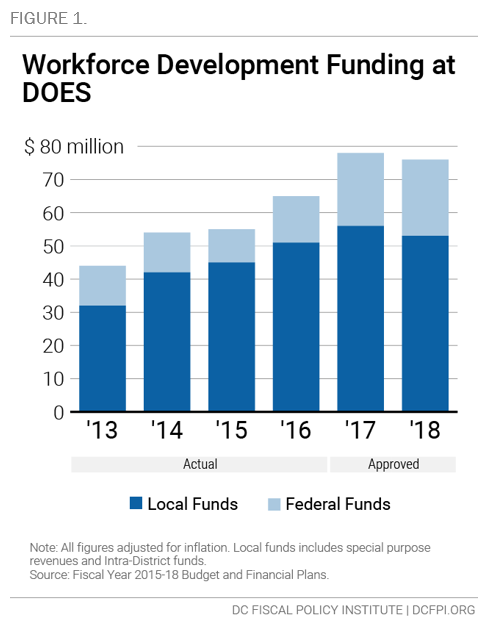
Subsidized Jobs Programs Will Grow Under the FY 2018 Budget
The FY 2018 budget continues to make investments in four subsidized job training programs: the Mayor Marion S. Barry Summer Youth Employment Program, the Transitional Employment Program, DC Career Connections, and the Learn Earn Advance Prosper program. Funding for subsidized job programs has been increasing steadily since 2014 (Figure 2).
- Marion S. Barry Summer Youth Employment Program (MBSYEP): MBSYEP is a locally funded program that provides District youth with summer work experiences through subsidized placements in the private and government sectors. The FY 2018 budget continues an expansion eligibility through age 24 that was first adopted in 2015, from the prior age limit of 21. The budget makes this age expansion permanent. The program expects to serve a total of 13,000 youth in the summer of 2018, including 900 22-24 year olds.
- Transitional Employment Program: The Transitional Employment Program (also called Project Empowerment) is a subsidized job program specifically targeted to returning citizens and others with high barriers to employment. The program also provides supportive services, with the goal of helping participants secure permanent, unsubsidized employment. The program served approximately 700 residents in FY 2016. Of these, 421 who were initially assigned to subsidized employment gained unsubsidized employment, at an average hourly wage of $14.89.[2]
- The DC Career Connections Program: DC-CC is a work readiness program started in 2016, specifically targeted to youth aged 20 to 24. It provides up to nine months and 40 hours per week of work experience, skills training, and individualized coaching and support to gain employment. The program served 400 youth last year, and expects to serve the same number this year.
- Learn Earn Advance Prosper (LEAP) Academy: The LEAP program was started in 2016 as a training and subsidized employment program for jobs in DC government, and is specifically targeted to long-term TANF recipients. For FY 2018, the budget includes $2.0 million. Since April 2015, there have been four cohorts of LEAP Academy members, serving a total of 111 participants. Of these, 93 have been permanently hired, a very high success rate.[3]
The budget also creates a new division within DOES, the Division of State Initiatives, which will house three of DOES’s subsidized job programs: the Transitional Employment Program, Career Connections, and the LEAP Academy.
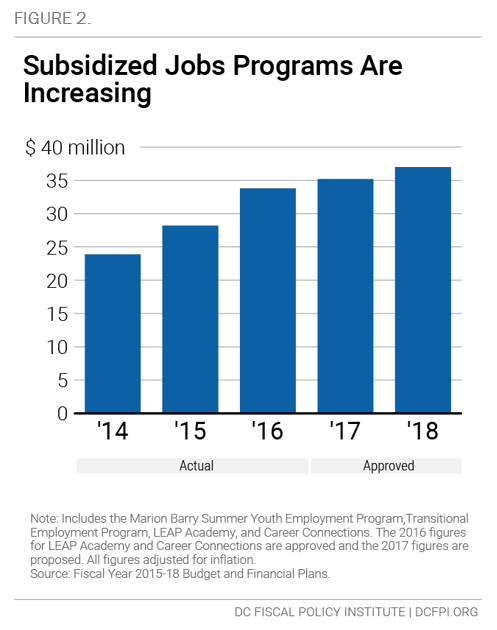
Underspending of Federal Money at DOES Continues to Be an Issue
DOES’s workforce budget includes a substantial investment of federal money (Table 2).
Unfortunately, DOES has spent less than its available funding in recent years, raising concerns about its ability to meet the needs of unemployed and underemployed residents. In 2016, the department spent $65 million on employment services, compared with $78 million in available funding (Figure 3).
DOES has recently made efforts to spend down more of its federal money on youth programs.[4] However, across all workforce programs at DOES, a total of $17 million in federal money from prior fiscal years has been left unspent, including $6.2 million for youth, $4 million for dislocated workers, and over $2 million in employment services.[5]
The high unemployment rate among residents without a college degree points to great needs for employment assistance. In 2016, some 15 percent of DC residents without a high school degree, and 16 percent of those with a high school degree, were unemployed in 2016, as compared with just 2.7 percent of residents with a college degree.[6] Addressing the factors behind the underspending should be a top priority for the Bowser administration.
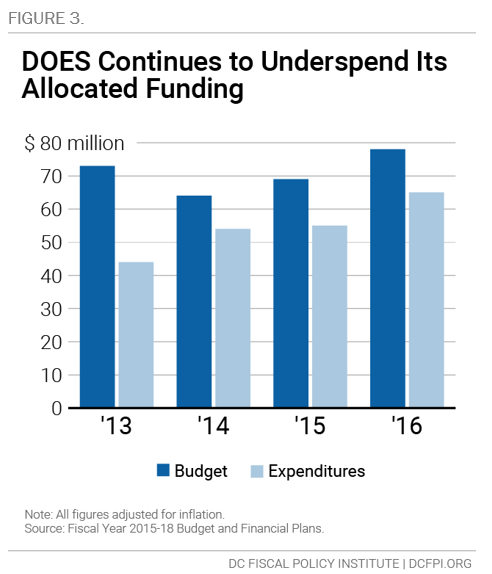
Budget Creates a New Infrastructure Academy for Jobseekers
The approved FY 2018 budget includes funds to create a new Washington DC Infrastructure Academy, located at the St. Elizabeth’s East Campus, which will provide job training in the infrastructure industry, including the utility, energy efficiency, transportation, and logistics sectors. The academy will establish a partnership between key partners in the infrastructure sector—businesses, trade unions, and the University of the District of Columbia—who would work together to provide work-based learning to underserved District residents to create a pipeline to employment.
The budget allocates $16.75 million in capital money to construct the facility by 2021.
Budget Fully Funds Start-Up Costs for Paid Family and Medical Leave
In December 2016, the DC Council passed the Universal Paid Leave Act (UPLA), which will provide eight weeks of paid leave for new parents to be with their children, six weeks to workers who need to care for an ill relative, and two weeks for workers to address their own health needs, beginning in 2020.
The estimated start-up administrative costs for the program are $40 million over 36 months. The FY 2017 budget had allocated $20 million toward these costs, and the approved FY 2018 budget will fund the additional $20 million needed to help the new office secure an IT program, office supplies, and other start-up costs.
This means that beginning on October 1, DC can move forward on implementation, so that workers receive their benefits by 2020 as mandated by the statute. UPLA stands to help not just DC workers, but also small businesses that currently cannot afford to provide paid family leave. An extensive analysis of this program found that it would provide additional benefits to DC residents and the economy, including increasing breastfeeding rates, reducing infant mortality, and increasing the number of women who participate in the labor market.[7]
Budget Provides $2 Million to Fund Transportation Subsidies for Adult Learners and Re-Engaging Youth
The approved FY 2018 budget includes $2 million to provide transportation assistance to adults in education and training programs. This is an important investment, because the cost of transportation has been identified as a major barrier to participation.[8]
Without transportation assistance, many adults miss classes and are unable to complete their programs. This means that the District has not been getting as much as it could out of its substantial investment of over $80 million in local and federal dollars to support educational instruction for adult learners.[9]
Budget Funds Some New Labor Laws, but Not All
Three labor laws were passed in 2016 that can go a long way to helping vulnerable workers. Each was passed subject to appropriation, which means they could not be implemented until funds were provided to meet their costs.
The final FY 2018 budget funds two of them:
- Building Service Employees Minimum Work Week Act of 2016: This new law sets a minimum work week of 30 hours for any employee performing janitorial or building maintenance services in DC office buildings, to ensure that workers will have predictable and adequate incomes. The estimated cost is $445,500 to pay for five full-time staff for education and enforcement.
- Fair Credit History Screening Act of 2016: This new law prohibits an employer from asking about or requiring a job applicant to provide information about their credit history during the hiring process. The estimated cost is $94,000 to pay for one full-time employee and a public education campaign.
However, the budget leaves one new labor law unfunded:
- Procurement Integrity, Transparency, and Accountability Amendment Act of 2016: This law requires that city contracts above $75 million have a Project Labor Agreement (PLA). Because contracts under PLAs generally provide for higher wages and benefits for workers, the total cost of each project could be higher. The estimated cost of this bill is $113,000 each fiscal year, and $26.2 million annually in capital funds.
This bill should be funded as soon as possible, so that workers can begin to benefit from it.
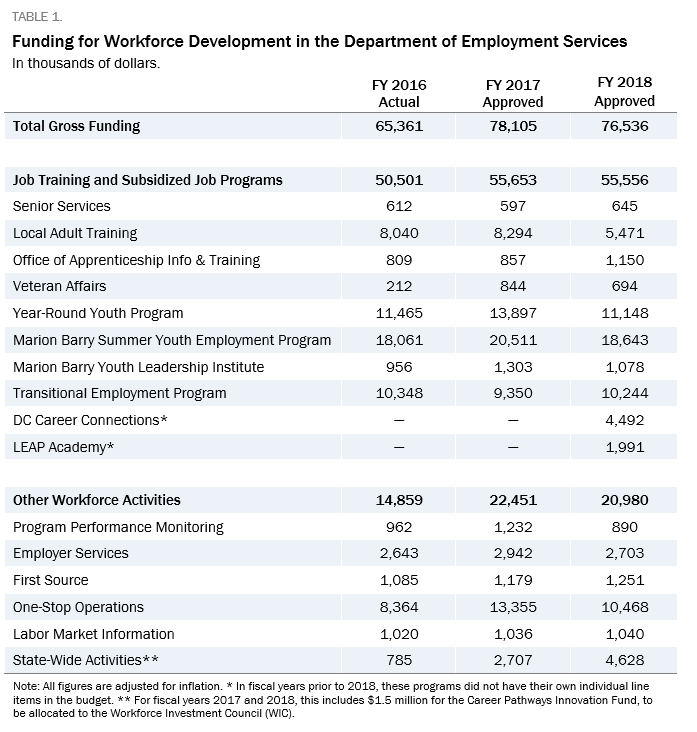
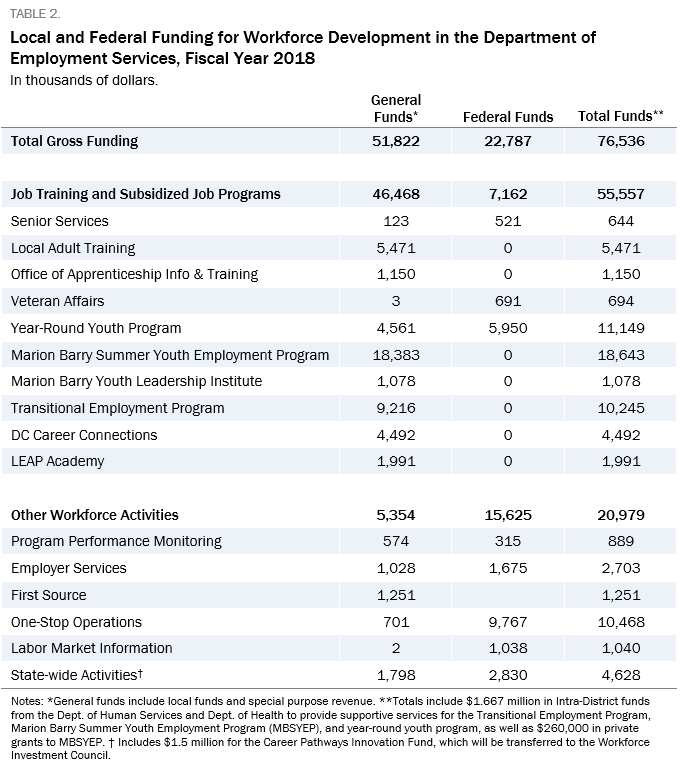
[1] A number of other DC agencies support workforce development services, such as the Department of Human Services, Department on Disability Services, Department of Youth Rehabilitation Services, Office on Aging, and others. Many of these agencies do not isolate workforce development funding in their budgets, however.
[2] DOES Performance Oversight Responses, #2. 2017. p. 16.
[3] DOES Performance Oversight Responses, #2. 2017. p. 4.
[4] March 30, 2016. “Grosso exchange of letters with DOES about WIC’s oversight of youth programs.” http://www.davidgrosso.org/grosso-analysis/2016/3/30/grosso-exchange-of-letters-with-does-about-wics-oversight-of-youth-programs
[5] FY 2018 Budget Oversight Documents, Attachment III-Federal Grants. http://dccouncil.us/files/user_uploads/budget_responses/CF0_FY18_Attachment_III.pdf
[6] Lassiter, L. 2017. “Still Looking for Work: Unemployment in DC Highlights Racial Inequity.” Washington, DC: DC Fiscal Policy Institute.
[7] DC Council Budget Office. 2016. “Economic and Policy Impact Statement: Universal Paid Leave.” http://dccouncil.us/news/entry/economic-and-policy-impact-statement-universal-paid-leave
[8] According to learner listening sessions conducted in 2015 by the DC Adult and Family Literacy Coalition (AFLC) and Fair Budget Coalition. In addition, over a third of 1,000 adult learners surveyed in 2016 by the DC AFLC reported their biggest transportation concern is its cost.
[9] Deputy Mayor for Education. 2016. “The Need for Transportation Subsidies and Assistance for Adult Learners.” http://lims.dccouncil.us/Download/36809/RC21-0140-Introduction.pdf
